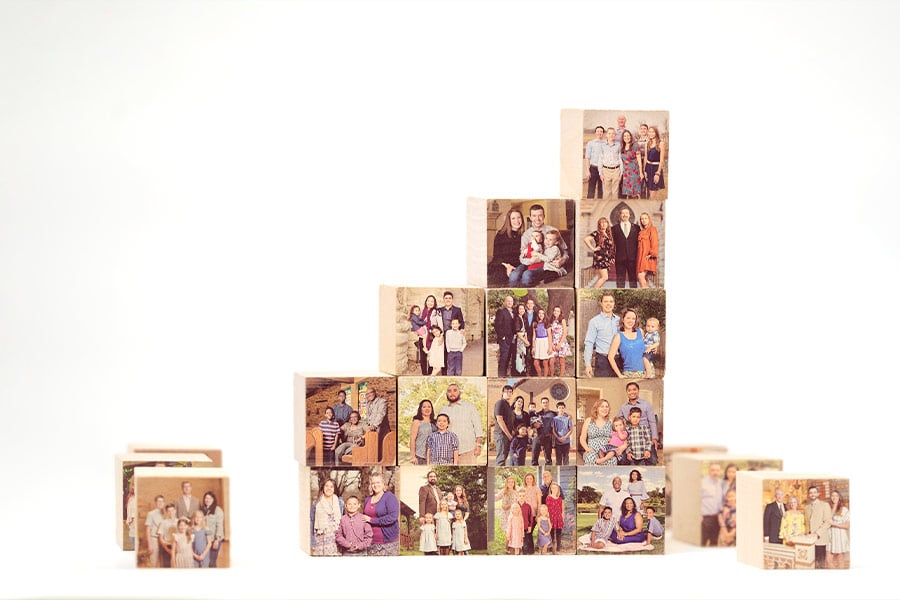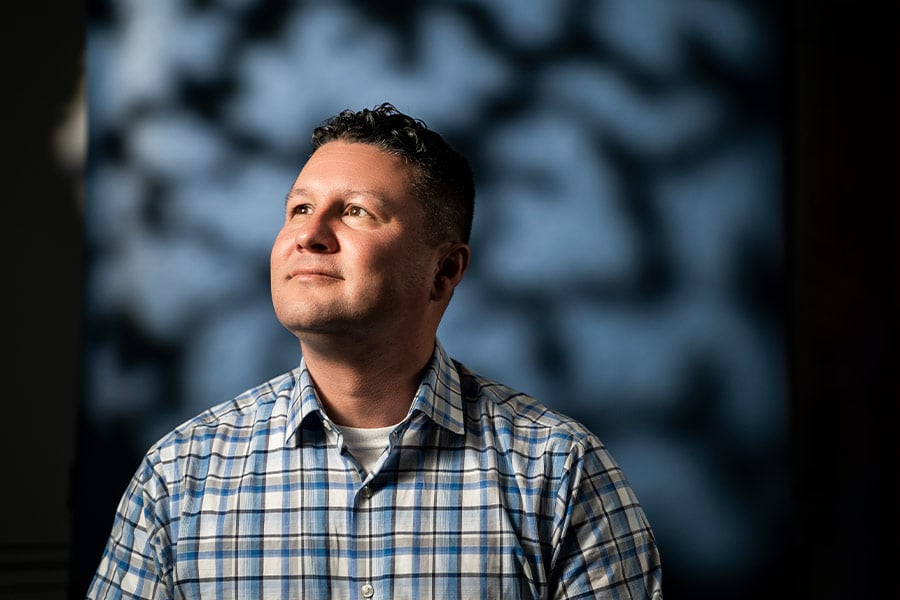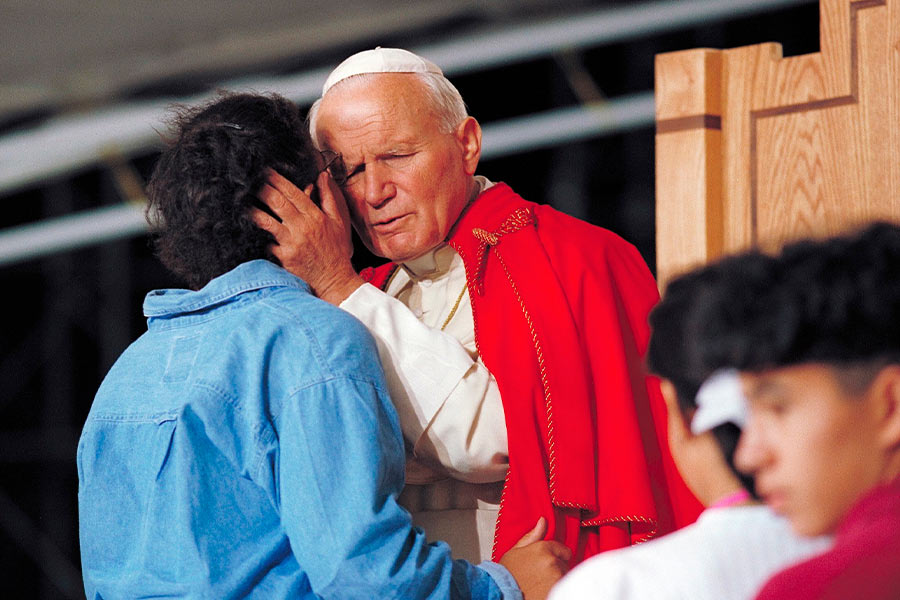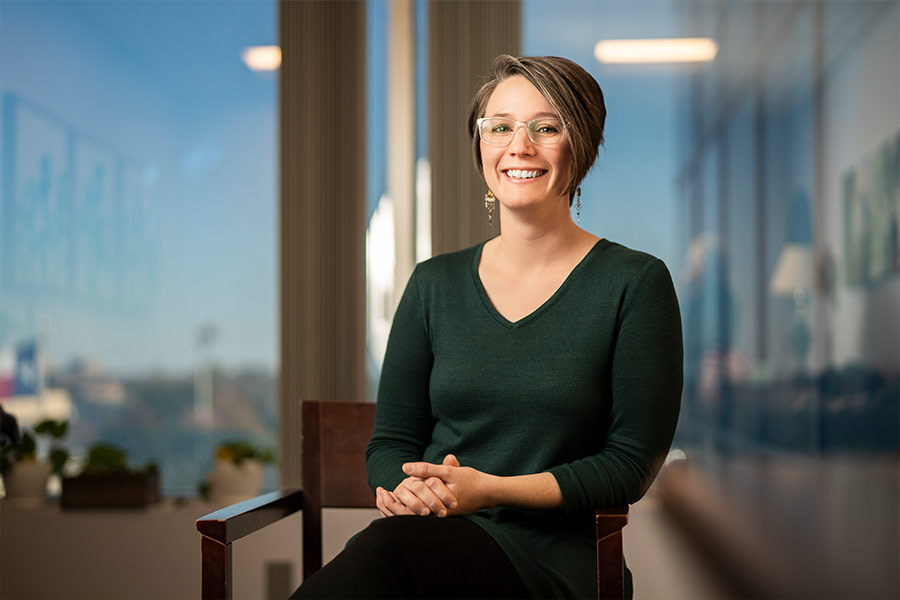Family, the building block

A pancake is simple, mostly flour, milk, and egg.
A pancake breakfast looks simple — just stack a few and top with butter and syrup. Then repeat as needed.
In the hands, or rather the spatulas, of the Knights of Columbus, a pancake breakfast can help accomplish a primary objective: to build up the family, which in turn strengthens the parish, thereby bolstering the Catholic Church.
Something that spends less than five minutes on a griddle can help the eternal Church?
Yes, said Pat Henz, the state program director for the Knights of Columbus and a parishioner at St. Jude Church in Mansfield.
Pancake breakfasts hosted by the Knights of Columbus, plus their ubiquitous Lenten fish fries, are more than fundraisers, he explains. Bonds are being formed: between men, among families, and across the parish.
For starters, the Knights work together to plan, cook, clean, and serve the meal. “These things don’t just happen,” he said, explaining how the Knights form relationships over the shared tasks.
At the meal, families come together to socialize, and children and teens have the chance to play or visit with peers with the same faith, beliefs, and values, Henz continued. Connections within the parish are enhanced.
And, without a word, children learn the importance of service and faith by seeing their fathers perform works of charity and assist the parish, Henz concluded.
Pancakes can help fuel families and parishes. That’s food for thought. And delicious.
THE DOMESTIC CHURCH
The family is the building block of society, according to Chris Vaughan, diocesan director of marriage and family life, because it’s where individuals first learn to live in a community with each other and with God.
Furthermore, the father of six asserted, the family is analogous to the Church. The family’s physical home compares to the parish church, the home of God.
In the parish, Vaughan said, you’ll find a father who “instructs us how to live; he shares the Scriptures with us; he evangelizes us; and he gives us something to eat — the Eucharist.” Parents do the same in their family home.

Chris Vaughan (NTC/Juan Guajardo)
By instilling values into their children, parents prepare them to enter the broader community for their next stage in life, just as the priest sends the congregation out to “go in peace to love and serve the Lord.”
Because of these similarities and more, the Catholic Church often refers to the family as “the domestic church.”
Paragraph 1666 of the Catechism of the Catholic Church explains, “The Christian home is the place where children receive the first proclamation of the faith. For this reason, the family home is rightly called ‘the domestic church,’ a community of grace and prayer, a school of human virtues and of Christian charity.”
The domestic church and the parish pulpit reinforce many of the same lessons in virtue and values. First, Vaughan said, “In family life, children learn that they’re not the center of the world. Particularly they learn that when they have siblings.”
A family teaches that an individual sometimes must compromise their opinion or wants for the good of the larger family.
He said, “Your siblings: you’re not always going to agree with them or like what they say, and you have to learn to be civil to them. That prepares us for life as an adult — an older brother or sister might prepare you for a [future] boss.”
The myriad of lessons from living in a family include “sharing, loving, sacrificing, living with joy, learning to live in community, learning life skills, praying for each other, supporting each other,” Vaughan listed quickly.
FUTURE SAINTS
Most of those habits and skills get shared unintentionally, from a child observing his parents live their daily lives.
The nine-year-old Karol Wojtyla learned a prayer to the Holy Spirit that his father said, and the boy continued to start each day with it for the rest of his life.
Later, when he was Pope John Paul II, he explained, “I never forgot this prayer. It was an important spiritual lesson, more durable and stronger than others which I could pull from readings or teachings which I received. With such conviction he spoke to me! Until this day, I can hear his voice. My encyclical letter about the Holy Spirit is the result of this lesson from my childhood.”
Most children don’t take what they learn from their parents and transform it into an encyclical, but those practices may help them grow up to be saints. And raise future generations of saints.

St. Pope John Paul II, shown here at World Youth Day in Denver in 1993, significantly deepened the theology of the domestic church. (CNS photo/Joe Rimkus Jr.)
Vaughan said, “If moms and dads work on growing in holiness, living the sacramental life, teaching their kids to pray, going to confession with their kids — that’s the real work of reforming ourselves, and when we reform ourselves, that passes on to the next generation.”
He continued, “Human nature, unchecked, will always go to the selfish. By trying to make ourselves saints, we fight against that spirit of selfishness, and we grow in greater love.”
The most important teachings to absorb in the domestic church can be pared down to two: faith and love.
St. Paul VI stated in Gravissimum Educationis (Declaration on Christian Education), and St. John Paul II repeated in Familiaris Consortio (The Fellowship of the Family), the importance for parents to help their children understand and live the two greatest commandments, which can be summed up as faith and love.
St. Paul VI wrote, “It is particularly in the Christian family, enriched by the grace and the office of the sacrament of Matrimony, that children should be taught from their earliest years to have a knowledge of God according to the faith received in Baptism, to worship Him, and to love their neighbor.”
FAMILY ORIGINS
As long as there has been a Catholic Church, the Church has taught about the importance of the family and the responsibility of parents to be the first evangelizers of their children.
In about 400 A.D., St. Augustine preached, “Do not neglect then the least of those belonging to you; look after the salvation of all your household with all vigilance” (Sermon 44).
The importance of the family is universal and timeless, and it begins with marriage, according to Father Karl Schilken, pastor of St. Bartholomew Parish in Fort Worth. In his January 16 homily, Fr. Schilken said, “In all societies, every place, since the beginning of time, certainly since the beginning of civilization, men and women have decided to get married and form their own family units. Marriage is a good and natural and holy thing, indeed. It’s a gift that God has given to all people since the beginning of time.
“People get married for the same purpose. To form a partnership of life, to have children, and to have their own families,” the pastor continued.
The universal propensity to marry becomes something even greater in the sacrament of Matrimony. “Matrimony is a sacrament, and a sacrament is simply an encounter with God that is given with the purpose of giving us grace, to help us on our journey toward the Kingdom,” he said.
The intent of the sacrament is twofold: for the husband and wife to build up and support the other person, and for the couple to be open to the gift of children and take the responsibility to teach and guide them in the ways of the Lord.
The Church states this explicitly in the Catechism and the Code of Canon Law, which states, “The marriage covenant, by which a man and a woman establish between themselves a partnership of their whole life, and which of its own very nature is ordered to the well-being of the spouses and to the procreation and upbringing of children, has, between the baptized, been raised by Christ the Lord to the dignity of a sacrament” (1055).
Fr. Schilken noted the sacrament of Matrimony can teach husbands, wives, and their children several truths about God.
The permanence and indissolubility of marriage “shows us on earth the fidelity of God, the constant presence of God. It is something that reminds us that God is permanently with us,” he said. “God is dependable — we can be assured of His presence.”
Also, husbands and wives are called to be faithful to one another in marriage. “The supernatural reality of Matrimony represents the way God loves His people…. God’s love for us is faithful, and we’re called to be faithful to one another.
“The love of husband and wife is a sign of Christ’s love for His Church. We are called to love one another in exactly the same way, to the point of sacrifice.
“Husbands and wives are called to a sacrificial love for one another where they give of themselves and forget themselves in the process of serving the family, in building up their own human family,” Fr. Schilken said.
Fr. Schilken said the importance and dignity of marriage and the family is often overlooked today.
“One of the greatest problems in our world today is we very quickly forget the dignity that we carry with us as Christians, the dignity that we carry with us because we are the adopted sons and daughters of God, brothers and sisters to Christ Jesus. Because we are brothers and sisters in Christ, we are capable of doing great things. We’re capable of proclaiming Christ and His Kingdom by the way that we live in our families,” said Fr. Schilken.
STRONG FAMILY, STRONG CHURCH
The sacrificial love of parents must be balanced with self-care and the freedom to be authentic, according to Amanda Averbeck, MS, LMFT associate, whose 15 years’ experience supporting families as an instructor of parenting classes, a caregiver, and a marriage and family therapist associate has given her a view of the frontlines of the domestic church.

Amanda Averbeck, MS, LMFT associate (NTC/Juan Guajardo)
The Holy Redeemer parishioner gives the example of Jesus, who preached and cared for others but also took time to be alone. She cited, “In the Gospels, Jesus took care of the needs of others through His ministry of healing; however, we also know He took time to re-center Himself and reconnect with God, alone, away from others.”
Averbeck, the oldest of nine children who were raised attending St. Mark Parish in Denton, has noted the importance for the Church to teach about family life “in a way that’s welcoming to families, so they can feel supported and continue in their vocation as a family.”
Pope Francis does just this in his exhortation Amoris Laetitia (The Joy of Love), which reflects on the complexities and realities of family life.
In the document, the Holy Father writes, “No family drops down from heaven perfectly formed; families need constantly to grow and mature in the ability to love” (325).
This quote resonates with the marriage and family therapist.
Averbeck explained, “It starts with the premise that we are human. We are imperfect. We are not going to get it right. This premise also highlights that more important than getting it right, is learning what to do when we don’t. Learning how to reconcile…. All the while communicating what we are experiencing to those around us,” she said.
Averbeck pointed out that dialogue and reconciliation is a practice, not a one-time event, but “a constant moving in the direction of growth and ability to love.”
Strengthening family bonds is also a continual process. The mother of two has a few recommendations.
“First,” she said, “have fun together. Allow time for play,” which will look different according to each family. Board games, sports, crafts, nature walks — whatever brings joy and laughter to the family.
“When families have a resource of knowing how to have fun and a memory bank full of happy memories, it makes it easier to stay vulnerable and remain a team while you tackle the tension or the difficult times families also go through,” she explained.
The second recommendation parallels the example of Jesus escaping into the hills to pray.
She said, “Work on yourself. What we allow to be healed in ourselves, gets passed on to our children. What we do not heal in ourselves gets passed on to our children too.”
Therapy can be a useful space for the introspection needed to nurture healthy coping patterns and more effective communication skills, helping the individual or family, and future generations, she said.
One benefit to a healthy family in which members know they are loved and supported, Averbeck observed, is those relationships provide a “huge protective factor” against mental and physical illness.
And another benefit of strong families touches on how families impact the communities (or the parishes) in which they reside.
BEYOND THE FAMILY
Ultimately, the family unit is the building block of society.
St. John Paul II expressed that idea in a homily in Perth, Australia on November 30, 1986. “As the family goes, so goes the nation, and so goes the whole world in which we live,” he said.
Averbeck’s first reaction to his quote is that it puts a lot of pressure on families, but when held in context with Pope Francis’ statement that “No family drops down from heaven perfectly formed; families need constantly to grow and mature in the ability to love,” the two quotes together offer hope.
She said, “If we can learn to be more compassionate and forgiving and learn the art of true reconciliation and dialogue in our families, how might that start to affect the types of relationships people form outside of their families? If people learn the skills in the family, they can apply them to the nation and the whole world.”
Plus, said Chris Vaughan, the diocesan director of marriage and family life, the Church and the family offer something unique to the world: love.
He said the values presented by the secular media — power, pleasure, wealth — look attractive, especially to young people.
Vaughan said, “The Church, the family, don’t have billions of dollars to influence, but what they do have, which Hollywood or media or apps can’t give, is love.”
And love, along with faith, begins in the family.
